广东外语外贸大学考博英语题型分析
- 格式:pdf
- 大小:822.15 KB
- 文档页数:15
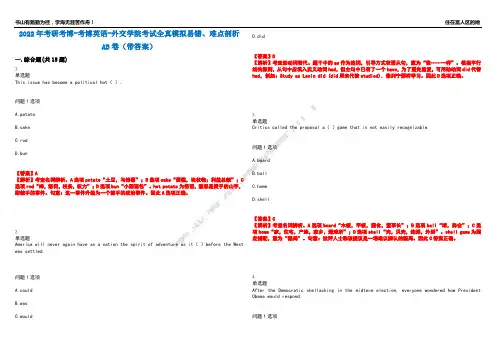
2022年考研考博-考博英语-外交学院考试全真模拟易错、难点剖析AB卷(带答案)一.综合题(共15题)1.单选题This issue has become a political hot().问题1选项A.potatoB.cakeC.rodD.bun【答案】A【解析】考查名词辨析。
A选项potato“土豆,马铃薯”;B选项cake“蛋糕,块状物;利益总额”;C 选项rod“棒,惩罚,枝条,权力”;D选项bun“小圆面包”。
hot potato为俗语,意思是烫手的山芋,即棘手的事件。
句意:这一事件升级为一个棘手的政治事件。
因此A选项正确。
2.单选题America will never again have as a nation the spirit of adventure as it()before the West was settled.问题1选项A.couldB.wasC.wouldD.did【答案】D【解析】考查助动词替代。
题干中的as作为连词,引导方式状语从句,意为“像……一样”。
根据平行结构原则,从句中应填入实义动词had,但主句中已有了一个have,为了避免重复,可用助动词did代替had,例如:Study as Lenin did (did用来代替studied).像列宁那样学习。
因此D选项正确。
3.单选题Critics called the proposal a()game that is not easily recognizable.问题1选项A.boardB.ballC.homeD.shell【答案】C【解析】考查名词辨析。
A选项board“木板,甲板,膳食,董事长”;B选项ball“球,舞会”;C选项home“家,住宅,产地,家乡,避难所”;D选项shell“壳,贝壳,炮弹,外形”。
shell game为固定搭配,意为“骗局”。
句意:批评人士称该提议是一场难以辨认的骗局。
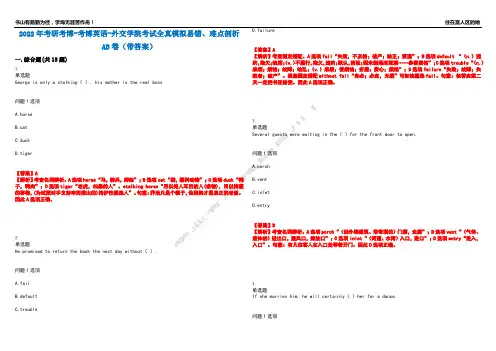
2022年考研考博-考博英语-外交学院考试全真模拟易错、难点剖析AB卷(带答案)一.综合题(共15题)1.单选题George is only a stalking(), his mother is the real boss问题1选项A.horseB.catC.duckD.tiger【答案】A【解析】考查名词辨析。
A选项horse“马,骑兵,脚架”;B选项cat“猫,猫科动物”;C选项duck“鸭子,鸭肉”;D选项tiger“老虎,凶暴的人”。
stalking horse“用以掩人耳目的人(或物),用以掩蔽的事物,(为试探对手支持率而推出的)掩护性候选人”。
句意:乔治只是个幌子,他妈妈才是真正的老板。
因此A选项正确。
2.单选题He promised to return the book the next day without().问题1选项A.failB.defaultC.troubleD.failure【答案】A【解析】考查固定搭配。
A选项fail“失败,不及格;破产;缺乏;衰退”;B选项default “(n.)违约,拖欠;缺席;(v.)不履行,拖欠,违约;默认,预设;因未到场而取消……参赛资格”;C选项trouble“(n.)麻烦;烦恼;故障;动乱;(v.)麻烦;使烦恼;折磨;费心;烦恼”;D选项failure“失败;故障;失败者;破产”。
根据固定搭配without fail“务必;必定,无疑”可知该题选fail。
句意:他答应第二天一定把书还给我。
因此A选项正确。
3.单选题Several guests were waiting in the()for the front door to open.问题1选项A.porchB.ventC.inletD.entry【答案】D【解析】考查名词辨析。
A选项porch“(沿外墙建筑、常带顶的)门廊,走廊”;B选项vent“(气体、液体的)进出口,通风口,排放口”;C选项inlet“(河道、水湾)入口,进口”;D选项entry“进入,入口”。
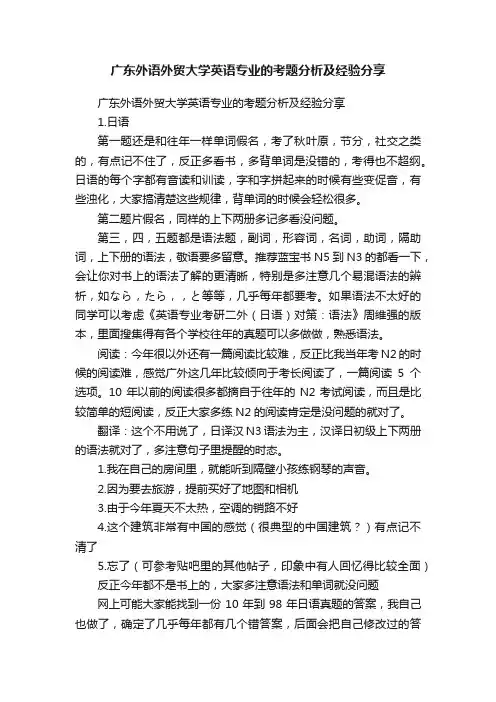
广东外语外贸大学英语专业的考题分析及经验分享广东外语外贸大学英语专业的考题分析及经验分享1.日语第一题还是和往年一样单词假名,考了秋叶原,节分,社交之类的,有点记不住了,反正多看书,多背单词是没错的,考得也不超纲。
日语的每个字都有音读和训读,字和字拼起来的时候有些变促音,有些浊化,大家搞清楚这些规律,背单词的时候会轻松很多。
第二题片假名,同样的上下两册多记多看没问题。
第三,四,五题都是语法题,副词,形容词,名词,助词,隔助词,上下册的语法,敬语要多留意。
推荐蓝宝书N5到N3的都看一下,会让你对书上的语法了解的更清晰,特别是多注意几个易混语法的辨析,如なら,たら,,と等等,几乎每年都要考。
如果语法不太好的同学可以考虑《英语专业考研二外(日语)对策:语法》周维强的版本,里面搜集得有各个学校往年的真题可以多做做,熟悉语法。
阅读:今年很以外还有一篇阅读比较难,反正比我当年考N2的时候的阅读难,感觉广外这几年比较倾向于考长阅读了,一篇阅读5个选项。
10年以前的阅读很多都摘自于往年的N2考试阅读,而且是比较简单的短阅读,反正大家多练N2的阅读肯定是没问题的就对了。
翻译:这个不用说了,日译汉N3语法为主,汉译日初级上下两册的语法就对了,多注意句子里提醒的时态。
1.我在自己的房间里,就能听到隔壁小孩练钢琴的声音。
2.因为要去旅游,提前买好了地图和相机3.由于今年夏天不太热,空调的销路不好4.这个建筑非常有中国的感觉(很典型的中国建筑?)有点记不清了5.忘了(可参考贴吧里的其他帖子,印象中有人回忆得比较全面)反正今年都不是书上的,大家多注意语法和单词就没问题网上可能大家能找到一份10年到98年日语真题的答案,我自己也做了,确定了几乎每年都有几个错答案,后面会把自己修改过的答案附上。
2.基英:(大家都懂的单词量决定英语专业的前途)题型都还是一样的完形填空,短文改错,gapfilling,六篇阅读完型和短文改错就没什么说的了,短文改错是星火专八60篇的水平,大家如果胡要练习的话还推荐冲击波会更难。

广东外语外贸大学出国英语培训入学考试真题全文共10篇示例,供读者参考篇1Hello everyone! Today I want to share with you my experience of taking the entrance exam for the English training program at Guangdong University of Foreign Studies.When I first heard about the exam, I was really nervous because I didn't know what to expect. But after studying hard and preparing myself, I felt more confident. The exam was divided into four parts: listening, reading, writing, and speaking.The listening part was a bit challenging for me because the speakers spoke really fast. But I tried my best to focus and understand the questions. The reading part was easier for me because I love reading English books and articles. I was able to answer most of the questions correctly.The writing part was a bit tricky because I needed to write an essay about my favorite holiday. I wrote about my trip to Disneyland and why it was the best holiday ever. I tried to use different vocabulary words and sentence structures to make my essay more interesting.Finally, the speaking part was the most fun! I had to talk about my daily routine and answer some questions from the examiners. I practiced speaking English with my friends and family, so I felt more confident during this part of the exam.Overall, I had a great time taking the entrance exam for the English training program at Guangdong University of Foreign Studies. I hope I did well and can't wait to start my English training soon!篇2Title: My Experience in the Entrance Exam for Studying Abroad English Training at Guangdong University of Foreign StudiesHey everyone! I want to share with you my experience in the entrance exam for studying abroad English training at Guangdong University of Foreign Studies. It was such a fun and exciting day!The exam was divided into four parts: listening, reading, writing, and speaking. In the listening part, we had to listen to different recordings and answer questions about them. Some of the recordings were really fast, but I tried my best to pay attention and write down the answers.The reading part was a bit challenging too. We had to read passages and answer questions based on them. Some of the passages were quite long, but I tried to scan them quickly and find the answers.The writing part was my favorite because I love writing stories. We had to write a short essay about our favorite hobby and why we like it. I wrote about how much I love playing soccer with my friends and how it helps me relax and have fun.Finally, the speaking part was nerve-wracking but exciting. We had to talk about a topic given by the examiner for two minutes. I talked about my dream of traveling around the world and how I want to learn English to communicate with people from different countries.Overall, the exam was a bit challenging but so much fun! I can't wait to find out the results and hopefully get accepted into the program. Wish me luck!篇3Hello everyone! Today, I'm going to tell you all about the entrance exam for the English training program at Guangdong University of Foreign Studies. It's like a big test to see if you're ready to study English and go abroad. Let's dive in!First, you have to know some basic English words and grammar. They'll ask you questions like "What's your name?" or "How old are you?" Don't worry, it's not too hard. Just study a bit and you'll be fine!Next, there will be a listening test. You'll hear people talking in English and you have to understand what they're saying. It's important to listen carefully and try your best to answer the questions.Then, there's a reading test. You'll read some passages in English and answer questions about them. Remember to take your time and read carefully. Don't rush through it!After that, there's a writing test. You'll have to write a short essay in English. Just think of it as telling a story or describing something you like. Remember to use proper grammar and punctuation.Finally, there's a speaking test. You'll talk to a teacher in English and answer their questions. Don't be shy, just do your best and try to speak clearly.So, that's the entrance exam for the English training program at Guangdong University of Foreign Studies. Remember to study hard and good luck on the test! You can do it!篇4Hi everyone! Today I want to share with you a really cool thing – the entrance exam for the English training program at Guangdong University of Foreign Studies. It's like a super fun challenge that could help us get better at speaking English and maybe even go abroad someday!So, in this exam, we have to show our English skills in listening, speaking, reading, and writing. For the listening part, we have to listen to conversations and answer questions about them. It's kind of like a game where we have to pay attention and think fast!Next up is the speaking part, where we have to talk about a topic for a few minutes. We can choose a topic we like and just talk about it. Maybe I'll talk about my favorite food or my favorite superhero!Then there's the reading part, where we have to read some passages and answer questions about them. It's like a puzzle that we have to solve with our reading skills. And finally, there's the writing part, where we have to write an essay about a topic. I'll make sure to use lots of big words and cool phrases to impress the examiners!I'm super excited about this exam because I really want to improve my English and maybe even study abroad one day. So, wish me luck and let's rock this exam together! Go English! Go GDUFS!篇5Hi everyone! Today I want to share with you the entrance exam questions for the study abroad English training at Guangdong University of Foreign Studies and Foreign Trade. Are you ready? Let's get started!Question 1:Why do you want to study abroad and improve your English skills? Please provide at least two reasons.Question 2:Please write a short paragraph (around 100-150 words) about your dream study abroad destination and why you want to go there.Question 3:Imagine you are traveling in a foreign country and you need to ask for directions to a popular tourist attraction. How would you communicate with the locals in English to find your way?Question 4:What are some of the benefits of studying abroad, besides improving your language skills? Please provide at least three examples.Question 5:If you could choose any job in the world that requires English language skills, what would it be and why? Please explain your choice in detail.Remember to answer each question thoroughly and express your thoughts clearly. Good luck on your exam! Let's all work hard to achieve our dreams of studying abroad and becoming fluent in English! Go, go, go!篇6Title: Let's have fun with the GDUFS Study Abroad English Training Entrance Exam!Hey guys, are you ready to have some fun and show off your English skills for the GDUFS Study Abroad English Training Entrance Exam? Let's dive into the exciting world of English together!First, let's warm up with some simple questions to get our brains going. Can you tell me the English names of some common animals like dog, cat, and bird? How about the colors red, blue, and yellow? Don't worry, these are just the basics!Now, let's move on to some more challenging questions. Can you put these words in the correct order to make a sentence: I, like, apples, do, you? How about figuring out the correct verb tense to complete this sentence: Yesterday, Tom (play) ______ basketball with his friends.Next, let's test your listening skills with a short audio clip. Listen carefully and answer the questions that follow. Don't worry if you don't get it right the first time, practice makes perfect!Finally, it's time for the reading comprehension section. Read the passage carefully and answer the questions to show off your reading skills. Remember, take your time and don't rush through it.Phew, that was a lot of brain work! But don't worry, just do your best and have fun with the GDUFS Study Abroad English Training Entrance Exam. Good luck, my fellow English learners! Let's show them what we've got!篇7Title: My Experience Taking the Entrance Exam for English Language Training at Guangdong University of Foreign StudiesHey everyone! So I want to tell you about my experience taking the entrance exam for the English language training program at Guangdong University of Foreign Studies. It was super exciting and a bit nerve-wracking, but I had a lot of fun too!The exam had a few different parts. First, we had to do a listening test where they played some recordings and we had to answer questions about them. It was kind of tricky because they spoke really fast, but I tried my best to listen carefully and write down the answers.Next, we had a reading comprehension section where we had to read some passages and answer questions about them. Some of the passages were really interesting, like one about a trip to a foreign country and another about a famous historical figure. I had to read carefully to make sure I understood everything.After that, we had a writing test where we had to write a short essay in English. I wrote about my favorite hobby, which isplaying soccer. I had to make sure to use good grammar and spelling, so I tried to be really careful with my writing.Finally, we had a speaking test where we had to talk about a given topic for a few minutes. I got a topic about my family, so I talked about my parents and siblings and what we like to do together. It was a bit nerve-wracking speaking in English, but I tried to be confident and speak clearly.Overall, the exam was a bit challenging, but I had a lot of fun showing off my English skills. I hope I did well and can get into the English language training program at Guangdong University of Foreign Studies. Wish me luck! Bye!篇8Title: My Experience in the Entrance Exam for Guangdong University of Foreign StudiesHey everyone! I want to tell you about my experience in the entrance exam for Guangdong University of Foreign Studies. It was super cool and a little bit nerve-wracking, but I had a lot of fun in the end.First, we had to do a listening test. The teacher played a recording and we had to write down what we heard. It was a littletricky because the recording was fast, but I did my best to catch everything. Then, we had a reading test where we had to answer questions about a passage in English. Some of the words were hard, but I tried to guess the answers based on the context.Next, we had a speaking test. We had to talk about our hobbies and favorite foods in English. I was a little shy at first, but the teacher was really nice and helped me feel more comfortable. Finally, we had a writing test where we had to write a short essay about our dreams and goals. I wrote about how I want to travel the world and learn about different cultures.Overall, the exam was a challenge, but I had a lot of fun and learned a lot. I can't wait to see if I get accepted into the program. Wish me luck!篇9Title: My Experience Taking the Entrance Exam for English Training at Guangdong University of Foreign StudiesHey guys, do you want to hear about my experience taking the entrance exam for English training at Guangdong University of Foreign Studies? It was super exciting and a little bitnerve-wracking, but I had a lot of fun!First, let me tell you about the exam. It had three parts: listening, reading, and writing. In the listening part, they played all kinds of recordings like conversations, news reports, and speeches. It was a bit tricky because they spoke really fast, but I did my best to answer the questions.Next was the reading part. They gave us a few passages to read and then asked us questions about them. Some of the passages were really interesting, like one about the history of the English language. I learned a lot just from reading them!Finally, there was the writing part. We had to write an essay on a given topic. I wrote about my dream of studying abroad and how learning English would help me achieve it. I made sure to use all the vocabulary and grammar I had learned in my English classes.After the exam was over, I felt relieved but also proud of myself for trying my best. I hope I did well and will get accepted into the English training program at Guangdong University of Foreign Studies. Wish me luck!Overall, taking the entrance exam was a great experience. It really tested my English skills and showed me how much I have learned so far. I can't wait to continue improving and become even better at English!篇10Once upon a time, I went to Guangdong University of Foreign Studies to take the entrance exam for studying abroad English training. It was super duper exciting, but also kind of nerve-wracking, ya know?The exam had a bunch of questions, like reading comprehension, vocabulary, grammar, listening, and speaking. It was like a big adventure through the land of English. I had to use all my brain power to answer the questions and show off my English skills.In the reading part, I had to read some stories and answer questions about them. It was like going on a reading journey and exploring different worlds. I had to really focus and understand the meaning of the stories. It was like solving a puzzle, but with words instead of pieces.For vocabulary and grammar, I had to match words with their meanings and choose the correct grammar rules. It was like playing a game of memory, but with English words. I had to remember all the words I learned and use them in the right way. It was a real brain workout, let me tell ya!Then, there was the listening part, where I had to listen to conversations and answer questions about them. It was like listening to a secret code and trying to figure it out. I had to really pay attention and tune my ears to understand what was being said. It was a challenge, but I think I did pretty good.Last but not least, there was the speaking part, where I had to talk about a given topic for a few minutes. It was like telling a story to a friend and sharing my thoughts. I had to be confident and speak clearly to show my English skills. It was a little scary, but I gave it my best shot.Overall, the exam was a fun and challenging experience. I learned a lot and had a great time exploring the world of English.I hope I did well and can continue my English adventure at Guangdong University of Foreign Studies. Wish me luck!。
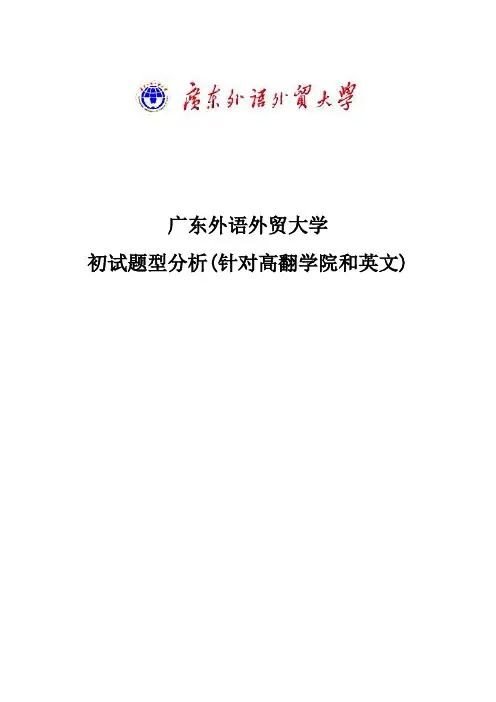
广东外语外贸大学初试题型分析(针对高翻学院和英文)初试题型分析(政治除外,以09年为准)初试除政治外,还有英语水平考试、写作与翻译考试和二外。
一、英语水平考试包括四个题型,选词填空(30分)、改错(30分)、近义词辨析填空(30分)、阅读理解(60分)。
其中,选词填空比较简单,可结合《新编英语教程》中的习题,应尽量得满分;改错难度与专八改错相当,建议使用冲击波改错辅导书;近义词辨析填空可结合《新编英语教程》中的习题,并极力推荐李长庚编《英语常用同义词近义词辨析词典》(东华大学出版社),掌握此书不仅对做选词填空题有益,而且对翻译和写作也很有裨益;阅读理解部分,06年以前(尤其是06年)这部分不难,07、08年未知,09年的题目难度较大,高于专八难度,内容涉及国际政治经济时事(如金融危机、美国大选)、文学评论、科技发展,最后一篇为描写性记叙文,难度也较大,是否阅读理解题的难度在逐渐加大?未知。
二、写作与翻译考试也包括三种题型四个考题,概要(40分)、写作(60分)、英译汉(25分)、汉译英(25分)。
其中,09年概要写作部分给定的材料是语言学方面的,易于理解,却难于概括,一般的写作教程(如丁往道的《英语写作手册》)中都会涉及summary的写作,但都谈得比较浅显,如果无法找到这方面的专著,建议使用丁往道的《英语写作手册》,平时进行适量的(不少于十篇)针对性练习,同学之间可以相互批阅、讨论,共同进步。
写作部分一般需自拟题目,字数400至600不等,为典型的四段或五段式作文,建议精读《GRE写作模板100篇》,并进行模仿练习,也可结合专八作文辅导进行练习。
尤其须注意一点,广外似乎偏好翻旧账,把往年已考的作文题再拿出来考,或原封不动,或细微改动,如04年与06年的作文题目相同,03年与09年的相同。
翻译部分,英译汉字数150-200,如03年150词,04年174词,09年200词左右,一般为文学翻译,或为文学评论,难度不大;汉译英字数150至400不等,如03年为150字,04年为290字,09年411字(清明上河图解),语体可能是章回体(03年,摘自《儒林外史》)、白话、现代白话等,难度较大。
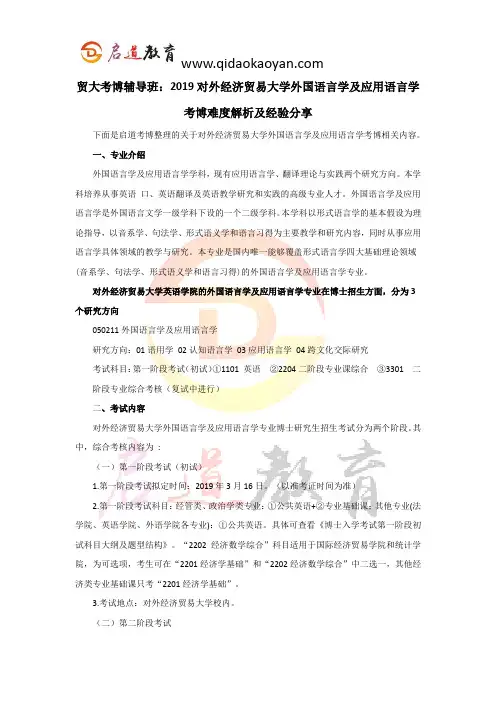
贸大考博辅导班:2019对外经济贸易大学外国语言学及应用语言学考博难度解析及经验分享下面是启道考博整理的关于对外经济贸易大学外国语言学及应用语言学考博相关内容。
一、专业介绍外国语言学及应用语言学学科,现有应用语言学、翻译理论与实践两个研究方向。
本学科培养从事英语口、英语翻译及英语教学研究和实践的高级专业人才。
外国语言学及应用语言学是外国语言文学一级学科下设的一个二级学科。
本学科以形式语言学的基本假设为理论指导,以音系学、句法学、形式语义学和语言习得为主要教学和研究内容,同时从事应用语言学具体领域的教学与研究。
本专业是国内唯一能够覆盖形式语言学四大基础理论领域(音系学、句法学、形式语义学和语言习得)的外国语言学及应用语言学专业。
对外经济贸易大学英语学院的外国语言学及应用语言学专业在博士招生方面,分为3个研究方向050211外国语言学及应用语言学研究方向:01语用学02认知语言学03应用语言学04跨文化交际研究考试科目:第一阶段考试(初试)①1101 英语②2204二阶段专业课综合③3301 二阶段专业综合考核(复试中进行)二、考试内容对外经济贸易大学外国语言学及应用语言学专业博士研究生招生考试分为两个阶段。
其中,综合考核内容为:(一)第一阶段考试(初试)1.第一阶段考试拟定时间:2019年3月16日。
(以准考证时间为准)2.第一阶段考试科目:经管类、政治学类专业:①公共英语+②专业基础课;其他专业(法学院、英语学院、外语学院各专业):①公共英语。
具体可查看《博士入学考试第一阶段初试科目大纲及题型结构》。
“2202经济数学综合”科目适用于国际经济贸易学院和统计学院,为可选项,考生可在“2201经济学基础”和“2202经济数学综合”中二选一,其他经济类专业基础课只考“2201经济学基础”。
3.考试地点:对外经济贸易大学校内。
(二)第二阶段考试1.第二阶段考试资格确定办法我校将根据第一阶段的考试成绩,划定进入第二阶段考核的资格线,只有达到资格线的考生方可进入第二阶段考核,请考生考后及时关注我校研究生院主页相关通知。
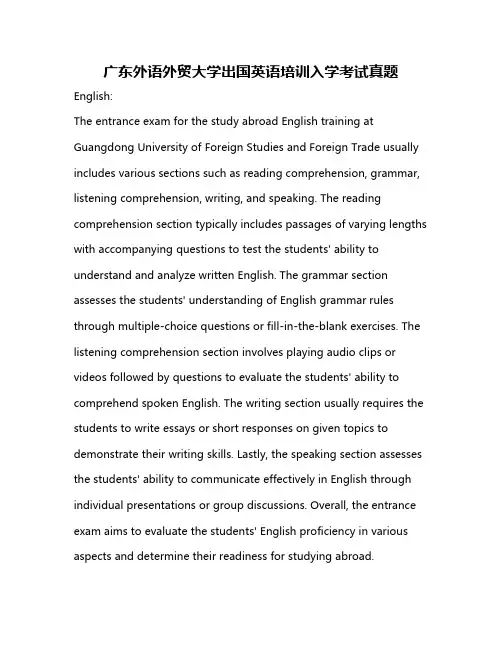
广东外语外贸大学出国英语培训入学考试真题English:The entrance exam for the study abroad English training at Guangdong University of Foreign Studies and Foreign Trade usually includes various sections such as reading comprehension, grammar, listening comprehension, writing, and speaking. The reading comprehension section typically includes passages of varying lengths with accompanying questions to test the students' ability to understand and analyze written English. The grammar section assesses the students' understanding of English grammar rules through multiple-choice questions or fill-in-the-blank exercises. The listening comprehension section involves playing audio clips or videos followed by questions to evaluate the students' ability to comprehend spoken English. The writing section usually requires the students to write essays or short responses on given topics to demonstrate their writing skills. Lastly, the speaking section assesses the students' ability to communicate effectively in English through individual presentations or group discussions. Overall, the entrance exam aims to evaluate the students' English proficiency in various aspects and determine their readiness for studying abroad.中文翻译:广东外语外贸大学出国英语培训入学考试通常包括阅读理解、语法、听力理解、写作和口语等不同部分。
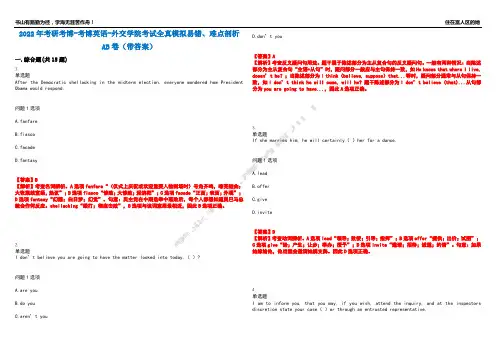
2022年考研考博-考博英语-外交学院考试全真模拟易错、难点剖析AB卷(带答案)一.综合题(共15题)1.单选题After the Democratic shellacking in the midterm election, everyone wondered how President Obama would respond.问题1选项A.fanfareB.fiascoC.facadeD.fantasy【答案】B【解析】考查名词辨析。
A选项fanfare“(仪式上庆祝或欢迎重要人物到场时)号角齐鸣,嘹亮短曲;大张旗鼓宣扬,热议”;B选项fiasco“惨败;大惨败;泥鸽靶”;C选项facade“正面;表面;外观”;D选项fantasy“幻想;白日梦;幻觉”。
句意:民主党在中期选举中落败后,每个人都想知道奥巴马总统会作何反应。
shellacking“殴打;彻底击败”,B选项与该词意思最相近,因此B选项正确。
2.单选题I don’t believe you are going to have the ma tter looked into today,()?问题1选项A.are youB.do youC.aren’t youD.don’t you【答案】A【解析】考查反义疑问句用法。
题干属于陈述部分为主从复合句的反义疑问句。
一般有两种情况:当陈述部分为主从复合句“主语+从句”时,疑问部分一般应与主句保持一致,如He knows that where I live, doesn’t he?;当陈述部分为I think(believe, suppose)that...等时,疑问部分通常与从句保持一致,如I don’t think he will come, will he? 题干陈述部分为I don’t believe (that)...从句部分为you are going to have...,因此A选项正确。

考博英语面试的问题(总8页)--本页仅作为文档封面,使用时请直接删除即可----内页可以根据需求调整合适字体及大小--考博英语面试的问题这是一篇由网络搜集整理的关于考博英语面试的问题的文档,希望对你能有帮助。
考博英语面试的问题篇一1. "What can you tell me about yourself"This is not an invitation to give your life history. The interviewer is looking for clues about your character, qualifications, ambitions, and motivations. The following is a good example of a positive response. "In high school I was involved in competitive sports and I always tried to improve in each sport I participated in. As a college student, I worked in a clothing store part-time and found that I could sell things easily. The sale was important, but for me, it was even more important to make sure that the customer was satisfied. It was not long before customers came back to the store and specifically asked for me to help them. I''m very competitive and it means a lot to me to be the best."1."关于你自己,你能告诉我些什么"这一问题并非在请你大谈你的个人历史。
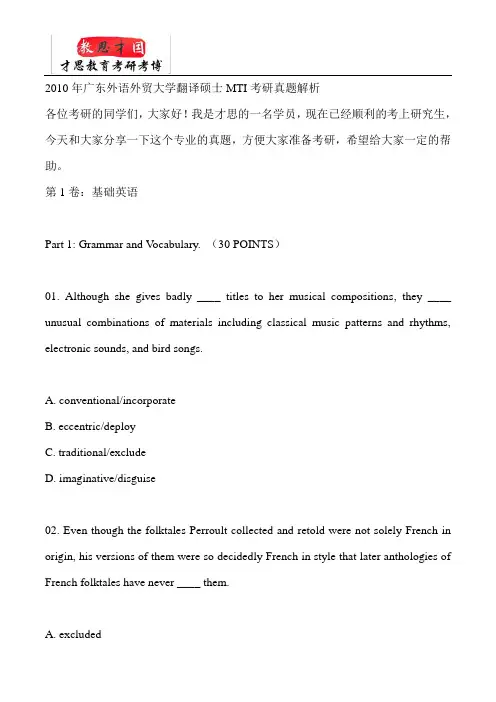
2010年广东外语外贸大学翻译硕士MTI考研真题解析各位考研的同学们,大家好!我是才思的一名学员,现在已经顺利的考上研究生,今天和大家分享一下这个专业的真题,方便大家准备考研,希望给大家一定的帮助。
第1卷:基础英语Part 1: Grammar and V ocabulary. (30 POINTS)01. Although she gives badly ____ titles to her musical compositions, they ____ unusual combinations of materials including classical music patterns and rhythms, electronic sounds, and bird songs.A. conventional/incorporateB. eccentric/deployC. traditional/excludeD. imaginative/disguise02. Even though the folktales Perroult collected and retold were not solely French in origin, his versions of them were so decidedly French in style that later anthologies of French folktales have never ____ them.A. excludedB. admiredC. collectedD. comprehended03. In arguing against assertions that environmental catastrophe is imminent, her book does not ridicule all predictions of doom but rather claims that the risks of harm have in many cases been ____.A. exaggeratedB. ignoredC. scrutinizedD. derided04. There seems to be no ____ the reading public’s thirst for books about the 1960’s: indeed, the normal level of interest has ____ recently because of a spate of popular television documentaries.A. quenching/moderatedB. whetting/mushroomedC. slaking/increasedD. ignoring/transformed05. Despite a tendency to be overtly ____, the poetry of the Middle Ages often sparks the imagination and provides lively entertainment, as well as pious sentiments.A. divertingB. emotionalC. didacticD. romantic06. One of the first ____ of reduced burning in Amazon rain forests was the chestnut industry: smoke tends to drive out the insect that, by pollinating chestnut tree, allow chestnuts to develop.A. reformersB. discoveriesC. casualtiesD. beneficiaries07. The research committee urged the archaeologist to ____ her claim that the tomb she has discovered was that of Alexander the Great, since her initial report has been based only on ____.A. disseminate/suppositionB. withdraw/evidenceC. undercut/capriceD. document/conjecture08. Although Heron is well known for the broad comedy in the movies she has directed previously, her new film is less inclined to ____: the gags are fewer and subtler.A. understatementB. preciosityC. symbolismD. melodrama09. Bebop’s legacy is ____ one: bebop may have won jazz the right to be taken seriously as an art form, but it ____ jazz’s mass audience, which turned to other forms of music such as rock and pop.A. a mixed/alienatedB. a troubled/seducedC. an ambiguous/aggrandizedD. a valuable/refined10. The exhibition’s importance lies in its ____: curators have gathered a diverse array of significant works from many different museums.A. homogeneityB. sophistryC. scopeD. farsightedness11. Despite the fact that the commission’s report treats a vitally important topic, the report will be ____ read because its prose is so ____ that understanding it requires an enormous effort.A. seldom/transparentB. carefully/pellucidC. little/turgidD. eagerly/digressive12. Carleton would still rank among the great ____ of nineteenth century American art even if the circumstance of her life and career were less ____ than they are.A. celebrities/obscureB. failures/illustriousC. charlatans/impeccableD. enigmas/mysterious13. Although based on an actual event, the film lacks ____: the director shuffles events, simplifies the tangle of relationships, and ____ documentary truth for dramatic power.A. conviction/embracesB. expressiveness/exaggeratesC. verisimilitude/sacrificesD. realism/substitutes14. When Adolph Ochs became the publisher of The New York Times, he endowed the paper with a uniquely ____ tone, avoiding the ____ editorials that characterized other major papers of the time.A. abstruse/scholarlyB. dispassionate/shrillC. argumentative/tendentiousD. cosmopolitan/timely15. There are as good fish in the sea ____ ever came out of it.A. thanB. likeC. asD. so16. All the President’s Men ____ one of the important books for historians who study the Watergate Scandal.A. remainB. remainsC. remainedD. is remaining17. “You ____ borrow my notes provided you take care of them”, I told my friend.A. couldB. shouldC. mustD. can18. If only the patient ____ a different treatment instead of using the antibiotics, he might still be alive now.A. had receivedB. receivedC. should receiveD. were receiving19. Linda was ____ the experiment a month ago, but she changed her mind at the last minute.A. to startB. to have startedC. to be startingD. to have been starting20. She ____ fifty or so when I first met her at the conference.A. must beB. had beenC. could beD. must have been21. It is not ____ much the language as the background that makes the book difficultto understand.A. thatB. asC. soD. very22. The committee has anticipated the problems that ____ in the road construction project.A. ariseB. will ariseC. aroseD. have arisen23. The student said there were a few Points in the essay he ____ impossible to comprehend.A. had foundB. findsC. has foundD. would find24. He would have finished his college education, but he ____ to quit and find a job to support his family.A. had hadB. hasC. hadD. would have25. The research requires more money than ____.A. have been put inB. has been put inC. being put inD. to be put in26. Overpopulation poses a terrible threat to the human race. Yet it is probably ____ a threat to the human race than environmental destruction.A. no moreB. not moreC. even moreD. much more27. It is not uncommon for there ____ problems of communication between the old and the young.A. beingB. would beC. beD. to be28. ____ at in his way, the situation does not seem so desperate.A. LookingB. LookedC. Being lookedD. To look29. It is absolutely essential that William ____ his study in spite of some learning difficulties.A. will continueB. continuedC. continueD. continues30. The painting he bought at the street market the other day was a ____ forgery.A. man-madeB. naturalC. crudeD. realPart 2: Reading Comprehension. (40 POINTS)Passage AOn New Year’s Day, 50,000 inmates in Kenyan jails went without lunch. This was not some mass hunger strike to highlight poor living conditions. It was an extraordinary humanitarian gesture: the money that would have been spent on their lunches went to the charity Food Aid to help feed an estimated 3.5 million Kenyans who, because of a severe drought, are threatened with starvation. The drought is big news in Africa, affecting huge areas of east Africa and the Horn. If you are reading this in the west,however, you may not be aware of it—the media is not interested in old stories. Even if you do know about the drought, you may not be aware that it is devastating one group of people disproportionately: the pastoralists. There are 20 million nomadic or semi-nomadic herders in this region, and they are fast becoming some of the poorest people in the continent. Their plight encapsulates Africa’s perennial problem with drought and famine.How so? It comes down to the reluctance of governments, aid agencies and foreign lenders to support the herders’traditional way of life. Instead they have tended to try to turn them into commercial ranchers or agriculturalists, even though it has been demonstrated time and again that pastoralists are well adapted to their harsh environments, and that moving livestock according to the seasons or climatic changes makes their methods far more viable than agriculture in sub-Saharan drylands. Furthermore, African pastoralist systems are often more productive, in terms of protein and cash per hectare, than Australian, American and other African ranches in similar climatic conditions. They make a substantial contribution to their countries’national economies. In Kenya, for example, the turnover of the pastoralist sector is worth $800 million per year. In countries such as Burkina Faso, Eritrea and Ethiopia, hides from pastoralists’herds make up over 10 percent of export earnings. Despite this productivity, pastoralists still starve and their animals perish when drought hits. One reason is that only a trickle of the profits goes to the herders themselves; the lion’s share is pocketed by traders. This is partly because the herders only sell much of their stock during times of drought and famine, when they need the cash to buy food, andthe terms of trade in this situation never work in their favour. Another reason is the lack of investment in herding areas.Funding bodies such as the World Bank and USAID tried to address some of the problems in the 1960s, investing millions of dollars in commercial beef and dairy production. It didn’t work. Firstly, no one bothered to consult the pastoralists about what they wanted. Secondly, rearing livestock took precedence over human progress. The policies and strategies of international development agencies more or less mirrored the thinking of their colonial predecessors. They were based on two false assumptions: that pastoralism is primitive and inefficient, which led to numerous failed schemes aimed at converting herders to modern ranching models; and that Africa’s drylands can support commercial ranching. They cannot. Most of Africa’s herders live in areas with unpredictable weather systems that are totally unsuited to commercial ranching.What the pastoralists need is support for their traditional lifestyle. Over the past few years, funders and policy-makers have been starting to get the message. One example is intervention by governments to ensure that pastoralists get fair prices for their cattle when they sell them in times of drought, so that they can afford to buy fodder for their remaining livestock and cereals to keep themselves and their families alive (the problem in African famines is not so much a lack of food as a lack of money to buy it). Another example is a drought early-warning system run by the Kenyan government and the World Bank that has helped avert livestock deaths.This is all promising, but more needs to be done. Some African governments stillfavour forcing pastoralists to settle. They should heed the latest scientific research demonstrating the productivity of traditional cattle-herding. Ultimately, sustainable rural development in pastoralist areas will depend on increasing trade, so one thing going for them is the growing demand for livestock products: there will likely be an additional 2 billion consumers worldwide by 2020, the vast majority in developing countries. To ensure that pastoralists benefit, it will be crucial to give them a greater say in local policies. Other key tasks include giving a greater say to women, who play critical roles in livestock production. The rich world should pay proper attention to the plight of the pastoralists. Leaving them dependent on foreign food aid is unsustainable and will lead to more resentment, conflict, environmental degradation and malnutrition. It is in the rich world’s interests to help out.01. Which of the following CANNOT be concluded from the passage? ____A. Forcing Africa’s nomadic herders to become ranchers will save them from drought.B. The difference between pastoralist and agriculturalist is vital to the African people.C. The rich world should give more support to the African people to overcome drought.D. Environmental degradation should be the major concern in developing Africa’s pastoralism.02. The word “encapsulates”in the sentence “Their plight encapsulates Africa’s perennial problem with drought and famine.”(para.l) can be replaced by ____.A. concludes.B. involves.C. represents.D. aggravates.03. What is the author’s attitude toward African drought and traditional lifestyle of pastoralism? ___A. Neutral and indifferent.B. Sympathetic and understanding.C. Critical and vehement.D. Subjective and fatalistic.04. When the author writes “the policies and strategies of international development agencies more or less mirrored the thinking of their colonial predecessors.”(para.4), he implies all the following EXCEPT that the aid agencies did not ____.A. have an objective view of the situation in AfricaB. understand the unpredictable weather systems thereC. feel themselves superior in decision makingD. care about the development of the local people05. The author’s main purpose in writing this article is ____.A. to evaluate the living conditions of Kenyan pastoralistsB. to give suggestions on the support of the traditional pastoralism in AfricaC. to illustrate the difference between commercial ranching and pastoralismD. to criticize the colonial thinking of western aid agenciesPassage BCivil-Liberties advocates reeling from the recent revelations on surveillance had something else to worry about last week: the privacy of the billions of search queries made on sites like Google, AOL, Yahoo and Microsoft. As part of a long-running court case, the government has asked those companies to turn over information on its users’search behavior. All but Google have handed over data, and now the Department of Justice (DOJ) has moved to compel the search giant to turn over the goods.What makes this case different is that the intended use of the information is not related to national security, but the government’s continuing attempt to police Internet pornography. In 1998, Congress passed the Child Online Protection Act (COPA), but courts have blocked its implementation due to First Amendment concerns. In its appeal, the DOJ wants to prove how easy it is to inadvertently stumble upon pore. In order to conduct a controlled experiment—to be performed by a UC Berkeley professor of statistics—the DOJ wants to use a large sample of actual search terms from the different search engines. It would then use those terms to do its own searches, employing the different kinds of filters each search engine offers, in an attempt toquantify how often “material that is harmful to minors”might appear. Google contends that since it is not a party to the case, the government has not right to demand its proprietary information to perform its test. “We intend to resist their motion vigorously,”said Google attorney Nicole Wong.DOJ spokesperson Charles Miller says that the government is requesting only the actual search terms, and not anything that would link the queries to those who made them. (The DOJ is also demanding a list of a million Web sites that Google indexes to determine the degree to which objectionable sites are searched.) Originally, the government asked for a treasure trove of all searches made in June and July 2005; the request has been scaled back to one week’s worth of search queries.One oddity about the DOJ’s strategy is that the experiment could conceivably sink its own case. If the built-in filters that each search engine provides are effective in blocking porn sites, the government will have wound up proving what the opposition has said all along—you don’t need to suppress speech to protect minors on the Net. “We think that our filtering technology does a good job protecting minors from inadvertently seeing adult content,”says Ramez Naam, group program manager of MSN Search.Though the government intends to use these data specifically for its COPA-related test, it’s possible that the information could lead to further investigations and, perhaps, subpoenas to find out who was doing the searching. “What if certain search terms indicated that people were contemplating terrorist actions or other criminal activities?”Says the DOJ’s Miller, “I’m assuming that if something raised alarms, we would hand it over to the proper authorities.”Privacy advocates fear that if the government request is upheld, it will open the door to further government examination of search behavior. One solution would be for Google to stop storing the information, but the company hopes to eventually use the personal information of consenting customers to improve search performance. “Search is a window into people’s personalities,”says Kurt Opsahl, an Electronic Frontier Foundation attorney. “They should be able to take advantage of the Internet without worrying about Big Brother looking over their shoulders.”01. When the American government asked Google, AOL, Yahoo and Microsoft to turn over information on its users’search behavior, the major intention is ____.A. to protect national securityB. to help protect personal freedomC. to monitor Internet pornographyD. to implement the Child Online Protection Act02. Google refused to turn over “its proprietary information”(para. 2) required by DOJ as it believes that ____.A. it is not involved in the court caseB. users’privacy is most importantC. the government has violated the First AmendmentD. search terms is the company’s business secret03. The phrase “scaled back to”in the sentence “the request has been scaled back to one week’s worth of search queries”(para.3) can be replaced by ____.A. maximized toB. minimized toC. returned toD. reduced to04. In the sentence “One oddity about the DOJ’s strategy is that the experiment could conceivably sink its own case.”(para.4), the expression “sink its own case”most probably means that ____.A. counterattack the oppositionB. lead to blocking of porn sitesC. provide evidence to disprove the caseD. give full ground to support the case05. When Kurt Opsahl says that “They should be able to take advantage of the Internet without worrying about Big Brother looking over their shoulders.”(para. 5), the expression “Big Brother”is used to refer to ____.A. a friend or relative showing much concernB. a colleague who is much more experiencedC. a dominating and all-powerful ruling powerD. a benevolent and democratic organizationPart 3: Answering Questions. (20 POINTS)Passage AMillions of elderly Germans received a notice from the Health&Social Security Ministry earlier this month that struck a damaging blow to the welfare state. The statement informed them that their pensions were being cut. The reductions come as a stop-gap measure to control Germany’s ballooning pension crisis. Not surprisingly, it was an unwelcome change for senior citizens such as Sabine Wetzel, a 67-year-old retired bank teller, who was told her state pension would be cut by $12.30, or 1% to $1,156.20 a month. “It was a real shock,”she says. “My pension had always gone up in the past.”There’s more bad news on the way. On Mar. 11, Germany’s lower house of Parliament passed a bill gradually cutting state pensions—which have been rising steadily since World War II—from 53% of average wages now to 46% by 2020. And Germany is not alone. Governments across Western Europe are racing to curb pension benefits. In Italy, the government plans to raise the minimum retirement age from 57 to 60, while France will require that civil servants put in 40 years rather than 37.5 toqualify for a full pension. The reforms are coming despite tough opposition from unions, leftist politicians, and pensioners’groups.The explanation is simple: Europeans are living longer and having fewer children. By 2030 there will only be two workers per pensioner, compared with four in 2000. With fewer young workers paying into the system, cuts are being made to cover a growing shortfall. The gap between money coming in and payments going out could top $10 billion this year in Germany alone. “In the future, a state pension alone will no longer be enough to maintain the living standards employees had before they retired,”says German Health & Social Security Minister Ulla Schmidt. Says Italian Finance Minister Giulio Tremonti: “The welfare state is producing too few cradles and too few graves.”Of course, those population trends have been forecast for years. Some countries, such as Britain and the Netherlands, have responded by making individuals and their employers assume more of the responsibility for pensions. But many Continental governments dragged their feet. Now, the rapid runup in costs is finally forcing them to act. State-funded pension payments make up around 12% of gross domestic product in Germany and France and 15% in Italy—two percentage Points more than 20 years ago. Pensions account for an average 21% of government spending across the European Union. The U. S. Social Security system, by contrast, consumes just 4.8% of GDP. The rising cost is having serious repercussions on key European nations’commitments to fiscal restraint. “Governments have no choice but to make pensionreform a priority,”says Antonio Cabral, deputy director of the European Commission’s Directorate General for Economic & Financial Affairs.Just as worrisome is the toll being exacted on the private sector, corporate contributions to state pension systems—which make up 19.5% of total gross pay in Germany—add to Europe’s already bloated labor costs. That, in turn, blunts manufacturers’competitiveness and keeps unemployment rates high. According to the Institute of German Economics in Cologne, benefit costs reached a record 41.7% of gross wages in Germany last year, compared with 37.4% a decade before. French cement manufacturer Lafarge says pension cost of $121 million contributed to a 9% fall in operating profits last year.To cope, Germany and most of its EU partners are using tax breaks to encourage employees to put money into private pension schemes. But even if private pensions become more popular, European governments will have to increase minimum retirement ages and reduce public pensions. While today’s seniors complain about reduced benefits, the next generation of retirees may look back on their parents’pension checks with envy.QuestionsParaphrase Italian Finance Minister Giulio Tremonti’s statement “The welfare state is producing too few cradles and too few graves”? What is implied by the last sentence of the passage “While today’s seniors complain about reduced benefits, the nextgeneration of retirees may look back on their parents’pension checks with envy”? Passage BIn the old days, it was all done with cakes. For Marcel Proust, it was a visit to Mother’s for tea and madeleines that provided the access to “the vast structure of recollection”that was to become his masterpiece on memory and nostalgia, “Remembrance of Past Things.”These days, it’s not necessary to evoke the past: you can’t move without tripping over it.In an age zooming forward technologically, why are all the backward glances? The Oxford English Dictionary’s first definition of nostalgia reads: “acute longing for familiar surroundings; severe homesickness.”With the speed of computers doubling every 18 months, and the net doubling in size in about half that, no wonder we’re aching for familiar surroundings. Since the cornerstone of the Information Age is change, anything enduring becomes precious. “People are looking for something authentic,”says McLaren. Trouble is nostalgia has succumbed to trends in marketing, demographics and technology. “Nostalgia ain’t what it used to be,”says Michael J. Wolf, senior partner at Booz-Allen & Hamilton in New York. “These are the new good old days.”Baby boomers form the core of the nostalgia market. The boomers, defined by American demographers as those born between 1946 and 1964, are living long and prosperous lives. In both Europe and America, they remain the Holy Grail for admen,and their past has become everyone’s present. In a study on “entertainment imprinting,”two American marketing professors, Robert Schindler and Morris Holbrook, asked people ranging in age from 16 to 86 which popular music from the past they liked best. People’s favorite songs, they found, tended to be those that were popular when they were about 24, with their affection for pop songs diminishing on either side of that age. Doubtless Microsoft knows about entertainment imprinting, or at least nostalgia. The company hawks its latest Explorer to the strains of Simon and Garfunkel’s “Homeward Bound,”just as it launched Windows 98 to the tune of “Start Me up”by the Rolling Stones. Boomers remember both tunes from their 20s. If boomers are one market that values memories, exiles are another. According to the International Organization of Migration, more than 150 million people live today in a country other than the one where they were born—double the number that did so in 1965. This mass movement has sources as dire as tyranny and as luxurious as the freedoms of an EU passport. But exiles and refugees share one thing: homes left behind. Type in “nostalgia”on the search engine Google, and one of the first sites that pop up is the nostalgia page of The Iranian, an online site for Iran’s exiles, most of whom fled after 1978’s Islamic revolution. Perhaps the savviest exploitation of nostalgia has been the secondhand-book site alibris. com, which features stories of clients’rediscovering long-lost books on it. One John Mason Mings writes of the glories of finding a book with information on “Kickapoo Joy Juice,”a dreaded medicine of his youth. A Pennsylvanian waxes over alibris’s recovery of hisfirst-grade primer “Down cherry Street.”The Net doesn’t merely facilitate nostalgia —it promotes it. Web-based auction houses have helped jump-start markets for vintage items, form marbles to Apple Macintoshes.Cutting-edge technology, designed to be transient, has even bred its own instanostalgia. Last year a $666 Apple I went for $18,000 to a British collector at a San Francisco auction. “Historic! Microsoft Multiplan for Macintosh”crows one item on eBay’s vintage Apple secion. Surf to The Net Nostalgia Quiz to puzzle over questions like “In the old days, Altavista used to have which one of these URLs?”Those who don’t remember their history are condemned to repeat it. Or so entertainment moguls hope, as they market “70s TV hits like “Charlie’s Angels”and “Scooby Doo,”out next year, to a generation that can’t remember them the first time round. If you’ve missed a Puff Daddy track or a “Sopranos”episode, panic not. The megahits of today are destined to be the golden oldies of 2020, says Christopher Nurko of the branding consultant FutureBrand. “I guarantee you, Madonna’s music will be used to sell everything,”he says. “God help me, I hope it’s not selling insurance.”It could be. When we traffic in the past, nothing’s sacred.QuestionsExplain the beginning sentence “In the old days, it was all done with cakes.”What is the other big group besides baby boomers which values memories? What do these people share? What is “nostalgia market”? What do they sell in the nostalgia market?Part 4: Writing. (30 POINTS)Please reflect on the following opinion and write an essay of about 400 words elaborating your view with a well-defined title.Some people believe the key of the reform in the education system is a well-shared awareness that educations is there, instead of simply offering the knowledge important to the students, to improve the students in an all-round way, and especially to guide them to a careful pondering over such fundamental issues as life itself and social responsibility. An undue emphasis on knowledge-education and the resultant ignorance over the guidance to the students to a proper understanding of life will bring us nothing but a large number of “memorizing machines”. We can never expect a group of young people well prepared for the real social life.2014年考研专业课复习安排及方法问题一:专业课复习的复习进度及内容安排回答一:专业课的复习通常在9月或者更早就要开始了,集中复习一般放在11月-12月左右。
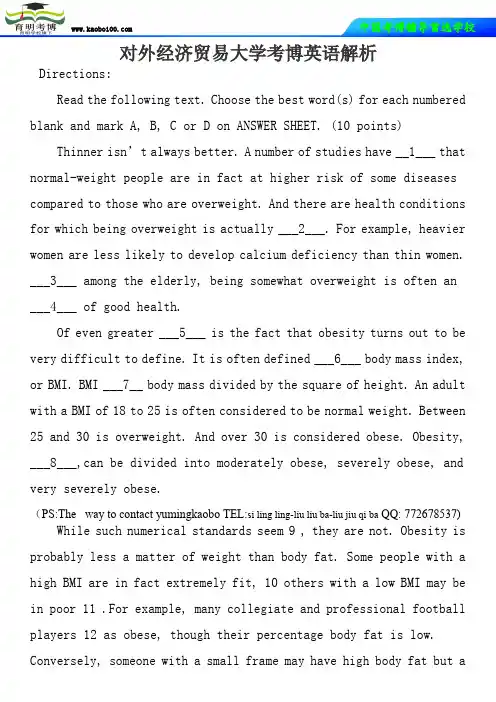
对外经济贸易大学考博英语解析Directions:Read the following text.Choose the best word(s)for each numberedblank and mark A,B,C or D on ANSWER SHEET.(10points)Thinner isn’t always better.A number of studies have__1___thatnormal-weight people are in fact at higher risk of some diseasescompared to those who are overweight.And there are health conditionsfor which being overweight is actually___2___.For example,heavierwomen are less likely to develop calcium deficiency than thin women.___3___among the elderly,being somewhat overweight is often an___4___of good health.Of even greater___5___is the fact that obesity turns out to bevery difficult to define.It is often defined___6___body mass index,or BMI.BMI___7__body mass divided by the square of height.An adultwith a BMI of18to25is often considered to be normal weight.Between25and30is overweight.And over30is considered obese.Obesity,___8___,can be divided into moderately obese,severely obese,andvery severely obese.(PS:The way to contact yumingkaobo TEL:si ling ling-liu liu ba-liu jiu qi ba QQ:772678537) While such numerical standards seem9,they are not.Obesity isprobably less a matter of weight than body fat.Some people with ahigh BMI are in fact extremely fit,10others with a low BMI may bein poor11.For example,many collegiate and professional footballplayers12as obese,though their percentage body fat is low.Conversely,someone with a small frame may have high body fat but a13BMI.Today we have a(an)_14_to label obesity as a disgrace.The overweight are sometimes_15_in the media with their faces covered. Stereotypes_16_with obesity include laziness,lack of will power,and lower prospects for success.Teachers,employers,and health professionals have been shown to harbor biases against the obese. _17_very young children tend to look down on the overweight,and teasing about body build has long been a problem in schools.1.[A]denied[B]conduced[C]doubled[D]ensured2.[A]protective[B]dangerous[C]sufficient[D]troublesome3.[A]Instead[B]However[C]Likewise[D]Therefore4.[A]indicator[B]objective[C]origin[D]example5.[A]impact[B]relevance[C]assistance[D]concern6.[A]in terms of[B]in case of[C]in favor of[D]in of7.[A]measures[B]determines[C]equals[D]modifies8.[A]in essence[B]in contrast[C]in turn[D]in part9.[A]complicated[B]conservative[C]variable[D] straightforward10.[A]so[B]unlike[C]since[D]unless11.[A]shape[B]spirit[C]balance[D]taste12.[A]start[B]quality[C]retire[D]stay13.[A]strange[B]changeable[C]normal[D]constant14.[A]option[B]reason[C]opportunity[D]tendency15.[A]employed[B]pictured[C]imitated[D]monitored16.[A][B]combined[C]settled[D]associated17.[A]Even[B]Still[C]Yet[D]Only18.[A]despised[B]corrected[C]ignored[D]grounded19.[A]discussions[B]businesses[C]policies[D]studies20.[A]for[B]against[C]with[D]withoutSection II Reading ComprehensionPart ADirections:Read the following four texts.Answer the questions below each text by choosing A,B,C or D.Mark your answers on ANSWER SHEET.(40 points)Text1What would you do with590m?This is now a question for Gloria Mackenzie,an84-year-old widow who recently emerged from her small, tin-roofed house in Florida to collect the biggest undivided lottery jackpot in history.If she hopes her new-found for tune will yield lasting feelings of fulfillment,she could do worse than read Happy Money by Elizabeth Dumn and Michael Norton.These two academics use an array of behavioral research to show that the most rewarding ways to spend money can be counterintuitive. Fantasies of great wealth often involve visions of fancy cars and extravagant homes.Yet satisfaction with these material purchases wears off fairly quickly what was once exciting and new becomes old-hat;regret creeps in.It is far better to spend money onexperiences,say Ms Dumn and Mr Norton,like interesting trips,unique meals or even going to the cinema.These purchases often become more valuable with time-as stories or memories-particularly if they involve feeling more connected to others.This slim volume is packed with tips to help wage slaves as well as lottery winners get the most"happiness bang for your buck."It seems most people would be better off if they could shorten their commutes to work,spend more time with friends and family and less of it watching television(something the average American spends a whopping two months a year doing,and is hardly jollier for it).Buying gifts or giving to charity is often more pleasurable than purchasing things for oneself,and luxuries are most enjoyable when they are consumed sparingly.This is apparently the reason MacDonald's restricts the availability of its popular McRib-a marketing trick that has turned the pork sandwich into an object of obsession.Readers of“HappyMoney”are clearly a privileged lot,anxious about fulfillment,not hunger.Money may not quite buy happiness,but people in wealthier countries are generally happier than those in poor ones.Yet the link between feeling good and spending money on others can be seen among rich and poor people around the world,and scarcity enhances the pleasure of most things for most people.Not everyone will agree with the authors’policy ideas,which range from mandating more holiday time to reducing tax incentives for American homebuyers. But most people will come away from this book believing it was moneywell spent。
1/13【育明教育】中国考研考博专业课辅导第一品牌官方网站: 12015年广东外语外贸大学考研指导育明教育,创始于2006年,由北京大学、中国人民大学、中央财经大学、北京外国语大学的教授投资创办,并有北京大学、武汉大学、中国人民大学、北京师范大学复旦大学、中央财经大学、等知名高校的博士和硕士加盟,是一个最具权威的全国范围内的考研考博辅导机构。
更多详情可联系育明教育孙老师。
学院:(010)高级翻译学院学科专业代码:055101学科专业名称:英语笔译本学科拟招生人数:80(说明:招生人数以教育部最终下达招生人数为准,此处仅作参考,可能会有调整)报考条件:学科简介:研究方向导师初试考试科目复试考试科目备注01商务翻译平洪李明刘季春2/13【育明教育】中国考研考博专业课辅导第一品牌官方网站: 2欧阳利锋褚东伟①101思想政治理论②211翻译硕士英语③357英语翻译基础④448汉语写作与百科知识①991翻译综合考试(笔译、口译)②992面试③719基础口译(同等学力加试)④720英汉互译(同等学力加试)02法律翻译赵军峰余东莫爱屏张新红①101思想政治理论②211翻译硕士英语③357英语翻译基础④448汉语写作与百科知识3/13【育明教育】中国考研考博专业课辅导第一品牌官方网站: 3①991翻译综合考试(笔译、口译)②992面试③719基础口译(同等学力加试)④720英汉互译(同等学力加试)03传媒翻译李明穆雷王海张保红何洪亮①101思想政治理论②211翻译硕士英语③357英语翻译基础④448汉语写作与百科知识①991翻译综合考试(笔译、口译)②992面试③719基础口译(同等学力加试)④720英汉互译(同等学力加试)4/13【育明教育】中国考研考博专业课辅导第一品牌官方网站: 404翻译与本地化管理穆雷葛诗利①101思想政治理论②211翻译硕士英语③357英语翻译基础④448汉语写作与百科知识①991翻译综合考试(笔译、口译)②992面试③719基础口译(同等学力加试)④720英汉互译(同等学力加试)复试形式与内容:初试参考书目•101|思想政治理论:请查看广东外语外贸大学研究生处网站•211|翻译硕士英语:1、《全日制翻译硕士专业学位(MTI)研究生入学考5/13【育明教育】中国考研考博专业课辅导第一品牌官方网站: 5试指南》,全国翻译硕士专业学位教育指导委员会编,外语教学与研究出版社,2009年。
贸大考博辅导班:2019对外经济贸易大学外语学院考博难度解析及经验分享对外经济贸易大学除硕博连读考试,硕博一体化项目选拔外,我校2019年通过普通招考两段制考试和申请—审核制(试行)开展博士生生源选拔。
招生制度将本着公平、公正、公开的原则,通过导师推荐、学院审核和基本能力测试,择优选拔优秀博士生。
一、院系简介对外经济贸易大学外语学院下设日语系、阿拉伯语系、朝鲜(韩)语系、法语系、西班牙语系、俄语系、意大利语系、德语系、越南语系、葡萄牙语系、波斯语系及希腊语系等十二个学系,除葡萄牙语、波斯语和希腊语专业外,均创建于二十世纪五十年代初期。
其中日语、阿拉伯语、朝鲜(韩)语、西班牙语、意大利语、越南语等专业为国家级特色专业建设点,此外还设有校级重点研究基地区域国别研究中心等科研机构。
拥有权威学术期刊《日语学习与研究》杂志。
研究生教育拥有外国语言文学一级学科点。
学院拥有一支实力较强的教学科研队伍,现有教师81名,其中教授14名,副教授32名,拥有博士学位的教师50名,此外还常年聘有外国专家、外籍教师及国内外客座教授近20 名。
二、招生信息对外经济贸易大学保险学院博士招生专业有3个:050204德语语言文学研究方向:01区域国别研究方向考试科目:第一阶段考试(初试)①1101英语②2204二阶段专业基础课考核③3301二阶段专业综合课考核050208阿拉伯语语言文学研究方向:01 外国文学方向02区域国别研究方向考试科目:①1101英语②2204二阶段专业基础课考核③3301二阶段专业综合课考核050210亚非语言文学(朝鲜语)研究方向:00不区分研究方向考试科目:第一阶段考试(初试)①1101 英语②2201 经济学基础③3301 二阶段专业综合考核(复试中进行)三、申请条件普通招考、申请—审核制基本条件(具体要求以招生学院专业目录、实施细则为准):1.拥护中国共产党的领导,愿意为社会主义现代化建设服务,品德良好,遵纪守法。
2022年考研考博-考博英语-外交学院考试全真模拟易错、难点剖析AB卷(带答案)一.综合题(共15题)1.单选题Beneath the rhetoric about who is practicing a purer form of the sport is a nasty battle over who will dominate access to the rocks——aficionados of “sport”.问题1选项A.creatorsB.enthusiastsanizersD.advocators【答案】B【解析】考查同义名词辨析。
A选项creators“创作者,造物主”;B选项enthusiasts“热心人,热衷者,狂热者”;C选项organizers“主办单位,举办方,举办者”;D选项advocator“提倡者,拥护者”。
句意:在关于谁在练习一种更纯粹的运动形式的言辞背后,是一场关于谁将主导进入岩石运动的恶战——“体育”的狂热者。
Aficionados“迷,狂热爱好者”,B选项与该词意思最相近,因此B选项正确。
2.单选题The sailor replied in a tone as angrily as(), that he had lost his leg abroad in defense of those who did nothing at home.问题1选项A.theyB.themC.theirD.theirs【答案】A【解析】考查代词辨析。
as angrily as they (replied),其中replied被省略,that从句是replied 的宾语,句意:水手用和他们一样愤怒的声调回答说,他在国外失去了一条腿,是为了保护那些在国内毫无作为的人。
因此A选项正确。
3.单选题Several guests were waiting in the()for the front door to open.问题1选项A.porchB.ventC.inletD.entry【答案】D【解析】考查名词辨析。
考博英语题型
【原创版】
目录
1.考博英语概述
2.考博英语的题型及分值分布
3.各种题型的备考策略
4.总结
正文
一、考博英语概述
考博英语,全称为博士研究生入学考试英语科目,是我国博士研究生招生全国统一考试的一部分。
其主要目的是测试考生的英语语言应用能力,以确保考生具备良好的英语水平,能够适应博士研究生阶段的学习和科研工作。
考博英语考试分为笔试和口试两个部分,其中笔试是主要的考试形式。
二、考博英语的题型及分值分布
考博英语笔试部分主要包括以下几种题型:
1.阅读理解(占总分值的 20%)
2.完形填空(占总分值的 10%)
3.翻译(占总分值的 15%)
4.写作(占总分值的 25%)
5.语法与词汇(占总分值的 10%)
6.逻辑与推理(占总分值的 10%)
三、各种题型的备考策略
1.阅读理解:提高阅读速度和理解能力,注重文章的主旨和细节。
可以通过多阅读英文文章和进行模拟练习来提高。
2.完形填空:注重词汇和语法的积累,分析句子结构,理解上下文。
可以多做真题练习,总结规律。
3.翻译:中英文互译都需要掌握。
注意翻译时要忠实原文,表达通顺。
可以通过翻译练习和积累词汇短语来提高。
4.写作:熟悉各类作文类型,注重文章结构和逻辑。
多进行写作练习,积累素材和表达。
5.语法与词汇:系统学习英语语法,积累词汇,加强练习。
6.逻辑与推理:提高逻辑思维能力,熟悉题型,多进行练习。
四、总结
考博英语考试对考生的英语语言应用能力有较高要求,需要考生在各个方面都具备一定的实力。
考博英语面试中的常见问题和答案详解1. 介绍一下你自己。
我是一名法律硕士(LLM)毕业生,专攻国际商法。
在过去的几年里,我在一家律师事务所担任法律助理的职位。
我对法律领域有着浓厚的兴趣,并希望继续深入研究和学术探索。
我选择考博是为了进一步提升自己的专业知识和研究能力。
2. 为什么你想要攻读博士学位?我希望通过攻读博士学位,能够在法律领域做出更深入的研究和贡献。
博士学位将使我能够深入研究我感兴趣的领域,并与其他专家进行学术交流,拓宽我的视野。
我相信博士学位将为我提供更多的机会,让我在学术界和法律实践中取得更大的成就。
3. 你为什么选择我们的学校?我选择贵校是因为贵校在法律领域有着卓越的声誉和学术资源。
贵校的教师拥有丰富的研究经验和广泛的学术网络,他们的研究成果和学术贡献在国际上也有很高的认可度。
我相信在贵校的研究环境中,我将能够接触到最前沿的法律研究和理论,并与其他优秀的学者共同研究和成长。
4. 你的研究兴趣是什么?我的研究兴趣主要集中在国际商法领域。
具体来说,我对跨境交易、国际仲裁和国际贸易法有着浓厚的兴趣。
我希望通过深入研究这些领域,能够为国际商务领域的法律实践提供有价值的解决方案和建议。
5. 你的研究计划是什么?我的研究计划是通过对国际商法的深入研究,探讨跨境交易中法律风险管理的有效策略。
我计划分析国际商法中的法律问题和挑战,并提出相应的解决方案。
我希望通过我的研究,能够为国际商务领域提供实用性和可行性的法律建议,以帮助企业在跨境交易中降低法律风险并提高效率。
6. 你在研究方面有何经验?在过去的几年里,我在法律事务所工作期间参与了多个国际商务案件的研究和处理工作。
我负责分析和解决涉及国际合同、国际贸易纠纷和仲裁程序的法律问题。
这些经历使我熟悉了国际商法的实践操作和研究方法,并培养了我解决复杂法律问题的能力。
7. 你认为自己的研究能够对学术界和实践产生什么影响?我相信我的研究将能够对学术界和实践产生积极的影响。
广东外语外贸大学英语考研复试经历上次我在初试成绩公布前上传了一些资料攒人品,结果成绩出来还不错。
这次也在复试结果出来之前分享下经历,求被录取,求有学上。
(我现在写经历帖还有一个原因,就是怕到时要是复试挂了,我可能没心思写了)关于初试在今年400+遍地开花的情况下,我的分数最多就算是中等。
关于如何提高的帖子,论坛上也有好些人发了,其实方法都是大同小异,无外乎扩大词汇提高阅读写作翻译能力等等,无论用什么学习方法,只要适合自己,能帮助自己提高就可以了,我就不在这献丑了,只谈谈我觉得需要注意的地方。
政治提到这课我就来气,花的时间也不少,红宝书来来回回都翻了好几遍,还买了网上课程来听,最后考出来的分数实在让我心酸,没公布成绩之前我甚至一度担忧不过线。
还好,最后算是勉强过关。
后来我检讨了自己,总结了失败的原因,如果要用一个字来形容我失败的原因,那就是:懒,如果要用四个字来形容,那就是:懒得做题。
我就做过肖的1000题,肖四任四也是随便做做就往边边丢,大题都没有碰。
就只有往年那几份真题做得仔细一点。
我那个时候把精力都放到专业课跟二外,这科做了真题,感觉选择都能拿30多分,总分应该能拿个70来分,无奈人算不如天算,今年感觉多项比往年难,我做得不好,于是乎,这一科悲催了。
个人经历谈:你可以不靠这科来拉总分,但是至少不能给它拖后腿,选择题要拿高分多做题才是王道啊!(我看政治考得不错的人大局部都是做蛮多题的)二外我的二外是日语,考得也不如我所预想的好。
原因同上,还是懒得做题,我只看初级上下册,另外买了一本配套的练习册,不过题都没怎么做,就连书上的课后习题也只做了20多课吧!后面全部放空。
(不是我觉得自己根底好,还是那句话,就是懒呀!我已经知道错了)我还有买了一本N3的真题,好似做了几题语法,然后又丢边边去了。
我后来在论坛逛,一比照人家学日语的方法,才知道,就我这懒劲,能考这分数已经阿尼陀佛了。
个人经历谈:这科是蛮关键的,考得好的都能挤入90分以上的高产阶级了,如果你专业课不突出,在这科也要稍微下点苦功夫。
2015广东外语外贸大学考博英语历年真题一、招考介绍从整体上看,由于博士生招生形势的不断发展各院校博士生入学考试的难度越来越大,对考生的外语水平要求也越来越高,特别是听、说能力。
攻读博士学位的学生,一方面应该具备坚实的专业理论基础和扎实的科研能力,另一方面还应该具备较高水平的外语能力。
二、广东外语外贸大学考博英语题型Part1:SummaryPart2:Essay WritingPart3:英翻中Part4:中翻英三、考博英语必备参考书育明考博教研部主编,河北大学出版社出版的《考博英语真题解析》和《考博词汇》是考博人必备的两本书。
在当当网,亚马逊和全国各大书店均有销售,也可以联系我们直接购买。
四、联系导师在初步定好考博学校之后,就要和所报考院校中意的老师取得联系,询问是否有招生名额,能否报考,这是我们考博成功的关键第一步。
大多数考生会在九月中下旬与导师取得联系。
因为太早,学校里面直博名额什么的还没有确定,报考的导师也不清楚是否有名额;太晚的话,怕别的学生比你早联系就不好了。
一般情况下,导师对一个学生很中意的话,后来联系的学生,导师一般也不会答应其报考了。
在此说点题外话,联系导师的过程中,如果读研期间的导师有关系,可以尽量利用。
如果没有,也没关系,凭着自己的本事也是可以和考博导师很好的沟通的,这就要看自己了。
通常跟导师初次联系,都是发邮件。
导师回复邮件的情况一般有几种:(1)、欢迎报考。
这种答复最笼统,说明不了问题。
我们可以接着努力和老师多沟通,看看具体的进展,避免出现初试之后却没有名额的情况。
(2)、名额有限,可以报考,但有竞争。
很多人说这样的回复不满意,认为希望很小一般会被刷。
其实这样还是比较好的一种回答,最起码导师没有骗你而且给你机会去证明自己,考的好就可以上。
(3)、你的研究方向和我一样......各种一大堆他的研究方向和你相关,欢迎报考什么的话。
不可否认,这是最好的情况,你可以放心的去考,一般不会出问题的。
但不排除偶然,像出现直博和本学校的硕转博名额问题,可能会给我们的报考和录取产生影响。
总之考博凭的是实力和自身的本事,关系只是占一部分,自己努力了就行,不用过分纠结于导师回复有没有啥隐含意思的。
初次联系好导师后,一定要注意跟导师保持联系。
每半个月或者一个月向导师汇报一下学习情况或者复习情况,交流一下科研方向,这很有必要。
一方面让导师觉得你很想去跟他深造,另一方面显得你虔诚好学。
五、听力答题技巧1、卷子发下来后快速的浏览一遍,包括题干和答案。
这样会大大提高你对听力的理解---知道它是讲什么内容,大概是怎么回事。
联系我们扣扣:四一六九二五五五九。
电话:四零零六六八六九七八。
扣扣群:一零五六一九八二零。
2、没听懂的题目,就放弃它,千万不要在听下道题的时候还在想上道题。
这样会引起头脑的混乱。
3、相信第一感觉,听力部分不是非常确凿的感觉的话不要改动开始的答案。
人的大脑有时候会混淆的。
因此很多情况下不是你选错了,而是改错了。
因此轻易别选,但是选了之后轻易别改。
(1)提炼选项中的重要信息考生务必先看选项。
当录音人开始宣读Directions时,考生应充分利用这段时间速读选项,预测考点,从而做到心中有数。
通过先看选项,可以明确题目多方面的信息。
(2)掌握节奏合理安排时间可能没有哪种考试对时间安排的要求比听力考试还要苛刻。
“录音不等人”,所以很多考生答题时都很紧张。
其实,听力考试每分钟阅读的字数和停顿时间有严格限制:约每分钟140词,每个问题后有约15秒停顿。
拍子已经固定,我们要做的是跟上节奏,过分的紧张只会造成混乱,直接影响发挥。
答题时,考生切勿在某一题上花费过多的时间(一般少于10秒/题),剩余的时间用于阅读下一题的选项和大胆猜测考点。
一旦没有听懂就根据已经掌握的信息迅速猜一个答案,马上进入下一题的节奏。
千万不可拖泥带水,否则破坏了节奏,可能造成随后的简单题目失分。
答案选定后可放松一口气,然后尽可能多看下一题乃至两题的选项。
(3)听力是一种Paraphrase考试Paraphrase就是运用同类词语的替换或句型的变换解释句或段的意义。
听力考试多数时候是一种paraphrase考试,它往往考的不是考生是否听见,而是考考生是否听懂。
把命题中的对话和段落原封不动地照搬到答案里,等着考生把它挑出来,在考博听力考试中这种题型几乎找不到。
绝大多数题目,要求考生把听到的原文进行变换和归纳,对应到选项中。
如此一来,我们不光得竖起耳朵听,还得开动脑筋想。
这就造成有的考生听懂了原文的每个字,却选不出答案。
要避免这种情况,请注意正确答案的固定特征:(4)听懂语调和重音英语和汉语一样,说话人通过各种各样的语调和重音的变化表达不同的意思。
考博听力中,专业的录音人更是力求表演得真实,他们绝不会用平淡的语调表示自己的惊讶,也绝不会把重音放在无关紧要的词上。
重读的每一处都具有提示作用。
因而,从录音人的表现中就能推测出人物的心理活动、观点和态度。
重音和语调是最为重要的线索。
辨认录音人语调中的信息在听力考试中比听懂单个词更重要。
(5)针对题型逐个演练不管是对话还是文段,听力考试的提问可分主题题型、细节题型、推断题型和语言点题型四大类。
我们可以在平时的练习中有意识的总结做题的方法和技巧。
六、阅读理解的解题技巧其实考博阅读的技巧是有针对性的,看整篇文章就是为了弄清文章的框架,具体的问题我们可以不管,但文章的层次必须弄清楚。
只有弄清了文章的层次,具体的问题才好归类,结合课后问题才能快速定位问题答案。
另外我发现考博的题目基本都围绕在文章的各层次主干上,细枝末节上基本没有涉题,于是就会发现,原文几百字的文章,真正需要了解的只有主干的几十字而已,其余的东西都可省。
当我们划去冗余,就会发现几十字的文章骨架基本覆盖所有的问题。
可见,对于考博阅读,若要高效正确的征服,必须学会快速分析文章的主干。
这就是基于逻辑的阅读,上升到理论层面的阅读模式。
下面进行具体分析:(1)主旨在英语阅读中要弄清楚层次,个人以为要弄清文章主旨,段落中心以及段落内部的次中心,这些在一些文章主旨题和一些细节题上很受用。
常规的文章主旨都会有其固定的出现地点:首段末尾处、第二段的开头和最后一段。
当然也有非常规的情况,这就需要靠自己的能力去寻找。
找主旨需要慢慢训练,常规的、非常规的文章都能通过真题并结合后面的专家解析,这样能力就能够很快地提升。
(2)常规文章行文逻辑本文中一直的强调要重视文章逻辑,那么,一般的都有哪些逻辑呢?通过一般归纳总结,大致可以得到四个逻辑框架。
这些框架特别有助于理解文章的总体内容,阅读过程按框架有重点地跳读,辨明逻辑主线,在把握文章重点、段落中心和段内次中心基础上,会有很好的效果。
也许,在做考博阅读之初,很多平日里有扎实功底的同学也会出现全军覆没的局面,出现这种情况,并不一定是英语词汇有巨大的缺知,而可能是逻辑上出现混乱。
现在将框架简单介绍如下:框架1:提出问题——分析问题——解决问题框架2:叙述现象——分析现象——结论框架3:提出观点——支持or反驳该观点——重申观点框架4:两种东西对比——分项对比——总体对照在阅读中要有意识的将文章归类分析,弄清逻辑,以上列出的是主干,还需进一步分析到枝叶,这样才能达到层次清晰的程度。
到段落级别,文章中心也容易辨出,多数文章中心在首末,少数会出现在段中。
于是在理解阅读文章的时候,在定位完毕后尽量将重点阅读范围扩大多句,观察所在句子在段落中的地位和在全文的地位。
一般情况,较接近的段中心和段落次中心往往就是正确答案,当然在最终填写答案的时候还是细细分析更为可靠。
(3)暗含答案的重点位置所谓文章重点就是阅读文章时得特别关注的地方,也是我们在浏览文章时眼界的着力点。
在考博阅读中,出题点一般都是文章中较为重要的地方,常见的有段落的中心和次中心;对于非中心,考博文章一般不会考察。
这是博士研究生入学考试的选拔性和阅读科技论文实用性所决定的。
上述的逻辑对于宏观题基本可以一网打尽,但对于微观题,我们必须通过重点位置的提示来解决。
下面通过一些分析和重点位置的介绍来理解把握文章的细节:1)所有文章的中心与段落中心和次中心。
2)转折和因果。
在阅读中,最好把含有转折和因果的词句标出来,因为转折和因果都意味着作者的观点和态度,相对一般句子更有强调性。
例如:because,for,but,however……3)表示观点的句子、观点的词可能多处出现,当然并不是所有观点的句子和词汇都是重点,但值得一读。
阅读文章中对这些词语的敏感是件令人兴奋的事情,所以平时应做好积累。
例如:agree,acknowledge,assert,see,insist,according to,find,think,believe,show,point out,content,acclaim,say等4)特殊标点符号,有的表示具体说明、有表解释、有表反义等等,均有或强或弱的强调意味,主要的特殊标点符号有:——、()、“”等。
5)情态动词。
should,must都能表达作者感情的因素,能从侧面反映作者对于某事物的观点,理应重点阅读。
6)特殊句型。
例如副词提前加逗号这种形式Variety,……,Significantly,……副词在句中起着很大作用,能反映态度,能表程度,这种特殊句型更有强调的成分,值得多阅读分析。
7)有指代的比较级、最高级和such/so等。
上面列举的一些重点特征很多,无异就是一些相对突出强调的词语。
阅读文章的时候,仅靠这些重点基本上可以做出大部分的阅读题。
阅读时快速画出重点,仅阅读含有重点特征的句子,对文章进行“减肥”,以提高阅读效率。
(4)选项特点1)正确答案的特点a、与原文句子同义词替换。
b、相对原文语法变化,如原文中的被动变为主动。
C、正面反面,即原文句子的否定形式,答案变成肯定的正面叙述;原文是肯定形式,从正面叙述,答案变成否定形式从反面叙述。
d、AB角度,原文从A角度叙述某事,而答案从B角度叙述同一件事情,本质不变。
e、具体抽象,即原文具体事例,答案变为抽象概括,或反之。
2)干扰选项的特点a、照抄原文,个别词语不同。
b、一半信息符合原文,一半信息不符。
c、将原文某些信息张冠李戴。
d、与原文叙述的内容相反。
e、与原文中没有出现观点新信息。
f、含有绝对化的词语,如only,always,never,all,everything,anything,everywhere,everybody,nobody。
g、逻辑错误,因果颠倒等。
最后,育明考博提醒:要做好考博英语阅读必须在扎实的英语词汇和语法的基础上,从不同角度对文章进行分解和思考。
平时做题把自己的对错记录在答案上,试题上最好不要标注答案,以后再练习时就能通过与以往的对比感受自己的进步,看到自己的不足。